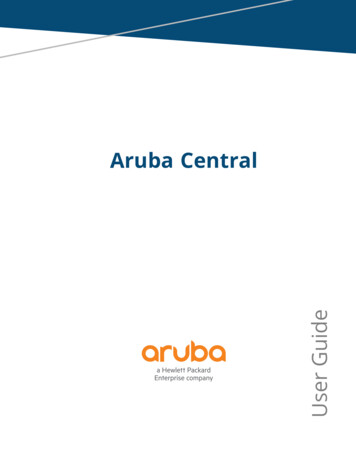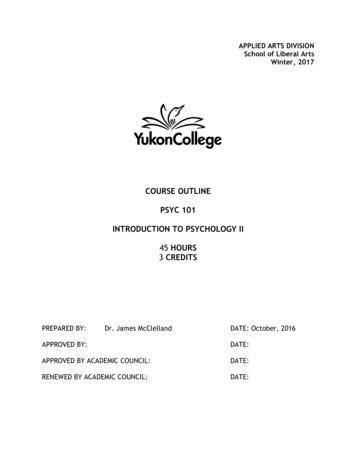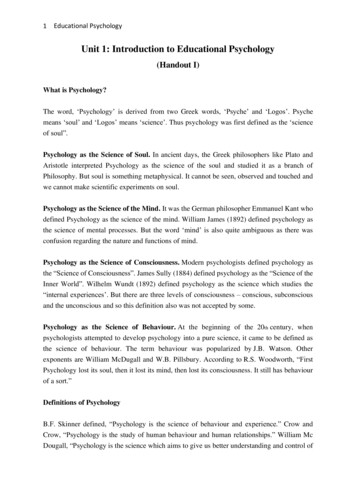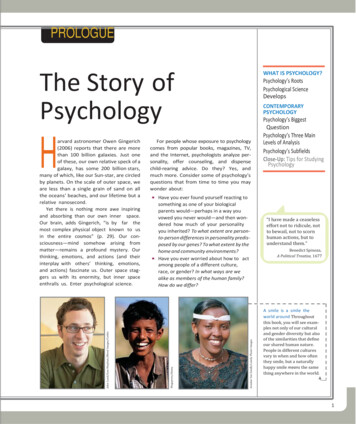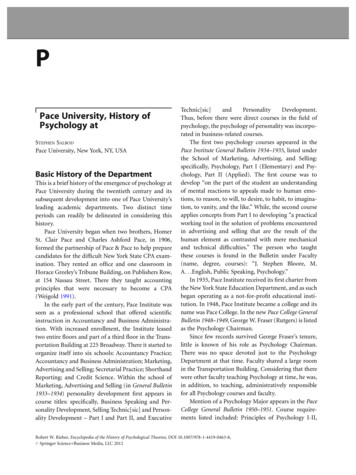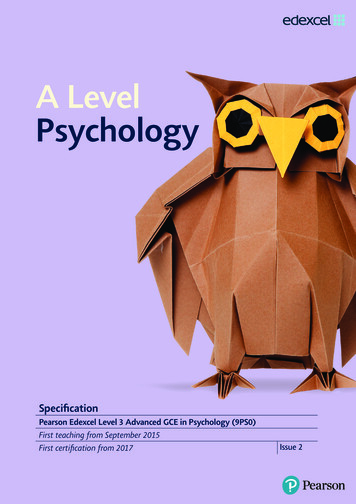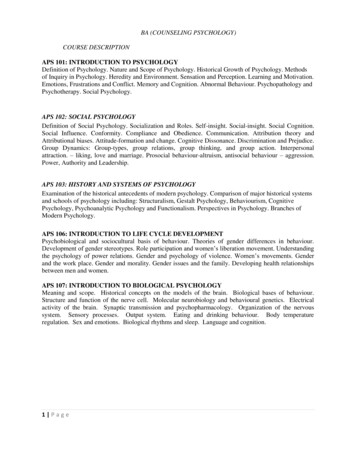
Transcription
BA (COUNSELING PSYCHOLOGY)COURSE DESCRIPTIONAPS 101: INTRODUCTION TO PSYCHOLOGYDefinition of Psychology. Nature and Scope of Psychology. Historical Growth of Psychology. Methodsof Inquiry in Psychology. Heredity and Environment. Sensation and Perception. Learning and Motivation.Emotions, Frustrations and Conflict. Memory and Cognition. Abnormal Behaviour. Psychopathology andPsychotherapy. Social Psychology.APS 102: SOCIAL PSYCHOLOGYDefinition of Social Psychology. Socialization and Roles. Self-insight. Social-insight. Social Cognition.Social Influence. Conformity. Compliance and Obedience. Communication. Attribution theory andAttributional biases. Attitude-formation and change. Cognitive Dissonance. Discrimination and Prejudice.Group Dynamics: Group-types, group relations, group thinking, and group action. Interpersonalattraction. – liking, love and marriage. Prosocial behaviour-altruism, antisocial behaviour – aggression.Power, Authority and Leadership.APS 103: HISTORY AND SYSTEMS OF PSYCHOLOGYExamination of the historical antecedents of modern psychology. Comparison of major historical systemsand schools of psychology including: Structuralism, Gestalt Psychology, Behaviourism, CognitivePsychology, Psychoanalytic Psychology and Functionalism. Perspectives in Psychology. Branches ofModern Psychology.APS 106: INTRODUCTION TO LIFE CYCLE DEVELOPMENTPsychobiological and sociocultural basis of behaviour. Theories of gender differences in behaviour.Development of gender stereotypes. Role participation and women’s liberation movement. Understandingthe psychology of power relations. Gender and psychology of violence. Women’s movements. Genderand the work place. Gender and morality. Gender issues and the family. Developing health relationshipsbetween men and women.APS 107: INTRODUCTION TO BIOLOGICAL PSYCHOLOGYMeaning and scope. Historical concepts on the models of the brain. Biological bases of behaviour.Structure and function of the nerve cell. Molecular neurobiology and behavioural genetics. Electricalactivity of the brain. Synaptic transmission and psychopharmacology. Organization of the nervoussystem. Sensory processes. Output system. Eating and drinking behaviour. Body temperatureregulation. Sex and emotions. Biological rhythms and sleep. Language and cognition.1 Page
200 LEVELAPS 201: PSYCHOLOGY OF PERSONALITYDefinition of Personality. Origins of Personality. Personality traits in various profiles. The social responseaspects in personality development. Theories of personality development. Personality adjustment andmaladjustment. The conforming versus non-conforming individual. Issues in personality development(cognitive processes, conditioning, identification, peer pressure, trial and error, modeling, methods of traitmodification).APS 203: CROSS-CULTURAL PSYCHOLOGYDefinition of Cross-Cultural Psychology. The subtle transaction between culture and behaviour. Cultureand psychopathology. Culture and Sense of Self-Control and Situational Control of one’s own behaviour.Need for achievement in one’s own culture. Stages of moral development and management styles in workenvironment. Culture and Values.APS 210: MOTIVATION AND EMOTIONBiological and sociological sources of needs. Consequences of gratification and frustration of needs.Maslows’s hierarchy of needs. Physiological basis of emotions. Consideration of competency, security,creativity, frustration, aggression, love, sexuality and values (aesthetics). Theories of emotion. Biological,psychological and sociological determinants of human emotions. Theories of motivation emphasizingwants and desires. Instincts. Unlearned biological drives. Emotional state consequences of reward andpunishment.APS 212: CHILD PSYCHOLOGYIntroduction to child psychology. Historical perspectives on child psychology. Theories of childdevelopment. Stages of development: prenatal, infancy, early childhood, late childhood, adolesence.Areas of development: physical, cognitive, social, emotional, moral and personality. Factors influencingchild development. Areas and methods of research on children. The child in context. Resilience inchildrenAPS 213: INTRODUCTION TO COUNSELLING PSYCHOLOGYGenesis and relevance of the modern counselling field. Definitions, goals and principles of psychologicalcounselling. Major stages in the historical evolution of the modern counselling specialty. History ofguidance practice in Kenyan schools. Vocational Psychology. Ways of disseminating career informationin schools. Role and relevance of counselling and guidance in industrial, hospital, government and nongovernmental organizations, and pastoral and family settings. Management and administration ofcounseling in school and non-school settings.APS 214: HUMAN SEXUALITYDefinition of human sexuality. Research methods in human sexuality. Male and female sexual anatomyand physiology. Sexual arousal and response. Gender identity and gender roles. Relationships, intimacyand communication. Sexual orientations and behaviour patterns. Sexuality in childhood, adolescence, andadulthood. Sexual dysfunctions. Contraception and abortion. Sexually transmitted infections, includingHIV/AIDS. A typical sexual variations. Sexual harassment, coercion and making responsible sexualdecisions.2 Page
ACU 201: METHODS AND TECHNIQUES OF SOCIAL SCIENCE RESEARCH (SchoolCommon Unit) (offered by department of Sociology)ACU 201: METHODS AND TECHNIQUES OF SOCIAL SCIENCE RESEARCH (SchoolCommon Unit (offered by department of Sociology)3 Page
300 LEVELAPS 304: ABNORMAL PSYCHOLOGYDefinition of Abnormal Psychology. Behaviour disorders: anxiety neurosis, obsessive-compulsivereactions, somatoform, personality, psychosexual, eating, affective, schizophrenic and dementia-relateddisorders. Recent clinical and experimental findings as they relate to major conceptions of mental illness.Origins, treatment, and case studies of common behavior disorders analyzed in the context of adaptivepersonality development. Behaviour disorders of childhood maladaptive groups. Drug dependency andtheir correlation to abnormal behaviour.APS 313: INTRODUCTION TO GROUP COUNSELLINGOrigin of group therapy. Theoretical approaches to group therapy. Formation of groups. Advantages ofgroup therapy. Situation where group therapy is needed. Group therapy: techniques, advantages,challenges and ethical issues.APS 307: THEORIES OF COUNSELLINGConceptual definitions. Nature and role of theory in counselling and psychotherapy. Qualities of a goodtheory. Leading counselling and psychotherapy theories: Freudian psychoanalysis. Adler’s individualpsychology. Jung’s analytical psychology. Ellis’ rational emotive therapy. Roger’s person-centredtherapy. Frankl’s logotherapy. Glasser’s reality therapy. Beck’s cognitive therapy. Cognitive behaviourmodification. Common elements in counselling theories. Relevance to the African conditions.APS: 315: PSYCHOLOGY AND CRIMEKey areas of criminological psychology. Evaluation of the range of contributions made bypsychology to the theory, prevention, and treatment of criminal behaviour. The prevention andinvestigation of crime, and the understanding of criminal justice processes. Crime and individualdifferences. Criminal career research. Preventing criminality. Varieties of criminal behaviour.Courtroom processes. Crime prevention and investigation. Victims and lifestyles.APS 319: PREMARITAL COUNSELLINGBasic conceptualizations. Young adulthood: identity and intimacy. Central characteristics of youngadulthood. Liking, loving and close relationships. The life cycle of close relationships. Initial attractionand beginning. Building a close relationship. Mate selection theories. Conflict issues in mate selection.Gender and social behaviour. Cohabitation and trial marriages. Impression formation and management.Social influence and decision. Factors influencing marital choice prospects in Africa.APS 320: COUNSELLING SPECIAL POPULATIONSMeaning and scope. Categories of the special population. Special counselling needs for specialpopulations: the military, the police, the exceptional child, the handicapped, the hyperactive client, thesingle-parent clientele, the nomadic, the elderly, the street-child, the bereaved, the retiree, the abused/thetraumatized client, the prisoner, the AIDS/HIV client, the hospitalized, and the drug-addict. Problem ofassessment and goal definition and realization. Ethical issues. Outcome evaluationAPS 322: ASSESSMENT PROCEDURES IN COUNSELLINGDefinition of terms. Assessment tools: Reliability and validity. Ethical issues in psychologicalassessment. Factors influencing psychological assessment. Types of assessment techniques: interest4 Page
inventories, personality testing, intelligence testing. Interpretation and use of test scores. Practicalapplication.APS 323: BEHAVIOUR MODIFICATIONDefinition and history of behaviour therapy movement. Contributions of learning theory to behaviourmodification principles. Major intellectual roots of the behaviour modifications paradigm (Watson,Pavlov, Skinner, Thorndike and Bandura). Fundamental principles, stages and techniques of behaviourmodification. Problems amenable to behaviour modification process. Cognitive behaviour modificationparadigm – a bridge between behaviour therapy and cognitive therapies.APS 324: EMOTIONS, PERSONAL MEANING AND COUNSELLINGBasic conceptualisations and Definitions. Emotion vs Reason. Emotion and Personal Meaning. Natureand Psychology of nasty emotions: anger, envy, and jealousy; existential emotions: Anxiety-fright, Guilt,and Shame; Emotions generated by unfavourable circumstances: Relief, Hope, and Sadness, andDepression; Emotions engendered by favourable life condition: Happiness, Pride, and Love; Theemphatic emotions: Gratitude, Compassion, and those aroused by aesthetic experiences.APS 325: INTRODUCTION TO FAMILY THERAPYHistorical background and basic conceptualizations. The concept of the family unit. The family lifecycle. Families and their development; Theories of family therapy: Psychodynamic, Behavioural,Structural, Transgenerational, Constructivist, Narrative and Solution Focused. Common family problem.Family assessment skills Therapeutic techniques: Genograms, use of paradox, narrative therapy,reframing and positive connotation. Ethical issues in family therapy. Family stress and coping in Africa.APS 327: SUBSTANCE ABUSE COUNSELLINGDefinition of terms. Substance abuse and chemical dependence: process, diagnosis, treatment andprevention. Group therapy. Support groups in the treatment and rehabilitation of the chemicallydependent. Effectiveness of recovery programs. Community responses to dependency problems.APS 330: RESEARCH PROJECTStudents will undertake a supervised research project in one of their areas of interest. A completed reportwill be submitted for assessment at the end of the course. Students will be expected to display originalityand mastery of content in their work. The submitted work must conform to the existing universityrequirements.5 Page
400 LEVELAPS 408: PSYCHOTHERAPY IN AFRICAThe African Worldview. Distinction between African Psychotherapy and Psychotherapy in Africa.African traditional medicine and African psychotherapy. Sources of the modern African identity. Trendsin contemporary African psychotherapy. Hope healing processes in modern Africa. Sources of gain inAfrican grief therapy. Family therapy in Africa. Multiculturalism and the culture impasse problem in thepsychological adaptation of the modern African youth.APS 415: CORRECTIONAL COUNSELLINGCritical analysis of the historical, contemporary, and future role of offender rehabilitation withinthe criminal justice system. Rehabilitation of offender: The ideal model and the Kenyanpractice. Criminal justice process: intervention points and service agencies. Juvenile justiceprocess. Problems of coercion, accountability and multi-agency co-ordination. Criminallifestyles and resistance.APS 416: INTRODUCTION TO SKILLS AND TECHNIQUES OF COUNSELLINGGeneral approaches to counseling skills and techniques. Building the therapeutic relationship. Stages ofthe counseling process. Basic skills in counseling: listening, paraphrasing, clarifying, questioning.Advanced skills: confrontation and summarizing. Ethical issues. Micro counselling practice. Peercounseling.APS 418: LIFE STYLE DISEASES AND REHABILITATIONBasic conceptualizations. Classification of life style diseases. Samples of life style diseases: substanceabuse, alcoholism, STDs, stress disorders, impulsivity or poor self control, poor anger management,suggestibility and gullibility, the excessive appetite and/or acute self starvation, perseveration, Type Abehaviour pattern. Rehabilitation approaches: nutritional therapy, behaviour therapy, self management,anger management (Meichenbaum’s model). Executive stress management.APS 421: COUNSELING PRACTICUM /APS 428: COUNSELLING PRACTICUMSUPERVISIONEach candidate is to attach himself/herself to a personally negotiated and certified work setting forpurposes of supervised field counselling practice. Each student is expected to submit, for grading, areport of their experiences following guidelines provided by the department.APS 422: LOSS AND GRIEF COUNSELLINGDefinition of terms. Types of loss. Reaction to loss across the life span. Effects of loss. Recovery fromloss. Stages of the grieving process. Forms of grieving and therapeutic effects. Factors influencing thegrief process. Cultural influences of the grieving process. Counselling the bereaved. Problems in grievingand recovery.APS 423: COUNSELLING CHILDREN AND ADOLESCENTSIssues in child and adolescent psychopathology. Types of childhood and adolescent disorders. Causes ofchildhood disorders: developmental, family, school, peers, media and environmental factors. Types andcauses of adolescent disorders. Assessment procedures of child and adolescent disorders. Interventionstrategies. Techniques of child and adolescent therapy. Play and Art therapy. Ethical considerations incounseling children and adolescents.6 Page
APS 424: PROFESSIONAL ISSUES AND ETHICSIntroduction to professional ethics. Values and ethics in the helping relationship. Client rights andcounselor responsibilities. Confidentiality. Managing boundaries and multiple relationships. Professionalcompetence and training. Multicultural perspectives. Ethical issues in group work. Ethical issues inmarital and family therapy. Supervision and consultation.APS 425: CRISIS INTERVENTION AND COUNSELLINGDefinition of terms. Approaches to crisis intervention; Types of crisis: PTSD, violence, sexual assault,bereavement; Crisis in institutions; Crisis hostage negotiation; Crisis intervention skills; Assessmentmodels; The ABC model of crisis intervention, Debriefing. Trauma management. Ethical Issues.APS 426: HIV AND AIDS COUNSELLINGOverview of human sexuality. Sexually transmitted infections: types, treatment. Historical background ofHIV/AIDS. Prevalence of HIV /AIDS. Predisposing factors. Transmission and symptoms. Prevention andtreatment. Voluntary Counseling and Testing. Pre testing and post test counseling. Theories of behaviorchange. Ethical and legal issues in HIV/AIDS counseling.APS 429: INTRODUCTION TO COUNSELING PRACTICUMDefinition and benefits of counselling practicum; introduction to practicum sites and dynamics;Counsellor professional identity; professional counselling forms: client intake form; client consent form;client case note form; Clinical record-keeping; case conceptualisation and micro-counselling: adolescencemodel cases; children’s models cases; HIV model cases; couple/family model cases; academic/careermodel cases; drug dependence model cases; mental disorders model cases; model cases in other areas;videotaping and presentation of client work; seminar presentation skills; group facilitation review andpractice; supervision during practicum; self-care and dealing with therapeutic failure; practicum reportwriting.APS 431: PSYCHOLOGY OF HEALTH, STRESS AND COPINGBiological, psychological and sociological determinants of human emotions. Stressors andresponses to stress. Stress and its correlation to psychosomatic illnesses. An evaluation of stresscausing emotions such as anger, grief, anxiety, and romantic love. The relationship betweenstress, coping and adaptation. Manifestation of stress in functional and somatic disorders.Managing stress through biofeedback and relaxation training.7 Page
8 Page
APS 213: INTRODUCTION TO COUNSELLING PSYCHOLOGY Genesis and relevance of the modern counselling field. Definitions, goals and principles of psychological counselling. Major stages in the historical evolution of the modern counselling speci
